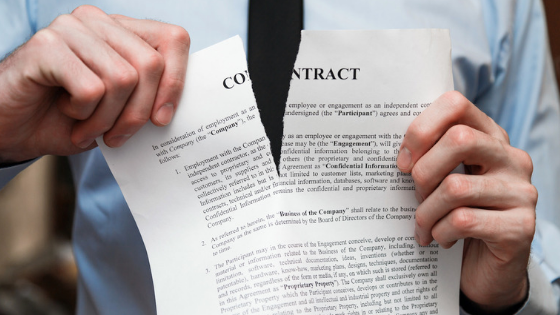How many contracts did you enter into this month? You might be surprised at the answer. Fact is, contracts are a way of life for small business owners. From contracts with developers, suppliers, sub-contractors and clients to your internet plan and office lease, almost every part of your business is regulated by the rule of contract law.
But what happens if contracts go wrong? Where do you turn first? Are you protected against the worst-case scenario?
Small business owners and sole traders need to be prepared for the unthinkable. A breach of contract can be as simple as a failure to provide services on time or in full, providing defective work or goods, or non-payment. Whatever the breach, it can be incredibly damaging to small businesses, so you need to do what you can to protect your business, your reputation and your assets.
First, there are a number of things you can do to prevent contract disputes:
Prepare written contracts
Start by ensuring you have the most essential contracts in place to protect your business. Formal contracts ensure that everyone is on the same page. Verbal agreements might seem like the easy option, but if things go wrong, there is no proof you ever had an agreement unless you put it in writing – as this business found out the hard way.
Check your contracts are by the book
Ask a legal adviser to review your contracts. Make sure you understand the industry standard and how (if at all) your contract deviates from the norm, and you are clear about your rights and obligations.
When in doubt, ask for help
If you don’t understand something in a contract, ask someone – preferably someone with legal knowledge. There’s no protection if you sign something you don’t understand and then find out later that you’ve breached the contract. Also talk to other professionals and fellow business owners in your industry.
Protect your business
Make sure you have sufficient insurance to cover your business and your employees. If something does go wrong, your insurance may be able to limit your risk and exposure.
If the unthinkable happens
Even if you tick all the boxes above, there’s still a chance that something can go wrong. That’s when you need to:
Know your rights
The good news is the Australian government has introduced a law to protect small businesses against unfair contract terms. This covers businesses with less than 20 employees, and who receive contracts valued up to $300,000 or up to $1 million for contracts longer than one year. Examples of unfair terms might be if the other business can change or cancel the contract, but you cannot. Or if the terms penalise you but not the other business for breaking the contract. Watch this ACCC video on unfair contracts or check out theASIC website
Explore your legal options
Most contract disputes can be resolved quickly and efficiently with open communication and calm negotiation. But if this fails, it’s time to refer to your Fair Trading state or territory agency, who will act as an informal negotiator. There are other options, too. For example, the WA Government offers an alternative dispute resolution service to help small businesses resolve disputes with other businesses or government departments. The service is low-cost and generally resolves disputes quickly. If you still cannot resolve the dispute, consider seeking legal advice or lodging a claim with the Small Claims Tribunal
Need more information?
- Download the Working with Contracts Guide, which was developed by the Federal Government to assist small business owners in using contracts confidently and appropriately.
- Visit the ACCC website for helpful information on contracts and agreements.






